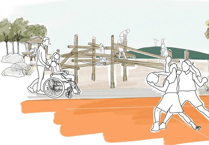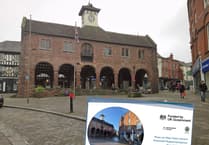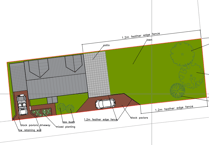PLANS to build a Lidl supermarket on the outskirts of Ross have been dismissed on appeal.
The impact on Ross town centre was cited as a key reason for refusing the appeal – and planning inspector Philip Major was also critical of Lidl’s intention to build a “standard rectangular box” on a main route into the town.
The plan – which was rejected by Herefordshire Council in July 2019 – would have seen buildings on the Wolf Business Park demolished and the erection of a new supermarket and other premises for “employment use”.
Lidl reckoned about 15 per cent of food shopping and the like – convenience shopping in the jargon – would be diverted to its store with about 2.5 per cent for big ticket items such as electricals – or comparison goods – while the council put a figure of 17.5 per cent.
Mr Major said the most significant impact on convenience shopping would be on the big players such as Morrisons and Aldi “who seem to trade strongly” but it would also affect smaller shops such as Spar and One Stop.
He added: “The very fact that the likes of Morrisons and Aldi offer convenient car parking is more likely to attract customers who will make linked trips to other town centre outlets.
“The degree to which that happens is not certain, but in my judgement it is likely to be significant.
For that reason the diversion of trade from the larger town centre retailers is likely to impact on other more specialist shops and services, with which the town centre seems to be well supplied.
“As such I consider that any reduction in town centre convenience shopping is also likely to reduce the turnover of smaller town centre shops because of that loss of linked trips.
“I am not satisfied that the level of impact on the town centre caused by the proposed store would be as limited as suggested by the Appellant.
Mr Major agreed that Lidl had passed the “sequential test” which requires town centre sites to be considered first, then edge of centre and finally out of town
The council has proposed three alternatives to the business park: Kyrle Street/Brookend Street, Trenchard Street/Homs Road and land near the Ashburton Industrial Estate.
The Trenchard Street site was “not persued to any degree the council and with Kyrle Street there was no real evidence of landowners being interested in making sites available and even if they did it would be extremely challenging to develop even if the company was to be very flexible.
While the land near Ashburton Industrial Estate could take a supermarket in the format required by the German budget store, there is currently no access and would need a significant amount of money to be spent on it.
Mr Major said the design of the “commonplace and bland” design “fell short of what might be expected in this locality” despite having improved on its standard buildings in other areas.
He added: “... the proposed store remains close to what might be deemed a typical company product. It is essentially a rectangular box with an almost flat roof profile using a limited palette of materials.
“The Appellant has demonstrably been able to adapt the standard company design in other locations, and this is a case where I consider a similar approach should have been taken.
“It is not for me to deliver design advice, but this gateway site to an historic town within the AONB deserves a design befitting of that context. In my judgement an opportunity for a building which would enhance the approach to Ross-on-Wye has been missed.”
People living near the site had expressed concern about the ability of the road network to cope with the extra traffic and also about safety but the inspector said assessments had shown the development would not cause issues.
The council also argued that the loss of trade could affect the historic fabric of the town centre but Mr Major said that was linked with the overall viability of the High Street and there was no evidence that a Lidl would pose a specific threat to individual “heritage assets”.
The council also made an application for costs, claiming that Lidl had acted “unreasonably” in the three years since it first made tentative inquiries.
An initial planning application was made against the advice of the council and later withdrawn and a second was refused by councillors with seven reasons despite the efforts of the council to limit them.
It was also alleged there were complaints about an officer and Lidl was “confrontational and adversarial with no meaningful commitment to work with the council.
The “off-the-peg” design was criticised and Lidl had not proposed any legal mechanism to deliver the “employment land” ahead of the store opening despite that being a requirement.
Lidl denied being confrontational and said it had a right to submit an application even if the council said it had little chance of success.
They said there was “nothing unreasonable or inappropriate” about contacting councillors nor in providing independent legal advice.
The company said the design was not off-the-peg “but responds to local context”.
In relation to the employment, they said a change in the law which means that planning permission is not needed to change a use meant no legal mechanism was necessary.
The inspector agreed it was not unreasonable to submit an application despite the council’s advice and neither was it inappropriate to contact councillors.
He said while he could not comment on the tone of the exchanges “but a degree of forthrightness cannot be described as unreasonable.
“The planning system can be adversarial and that inevitably includes the exchange of differing views, sometimes strongly held. It is not unreasonable to make those views known.”
Dismissing the costs application, he said that while he had found against the company, he did not consider there had been unreasonable behaviour in the way it had approached the case.





This article has no comments yet. Be the first to leave a comment.